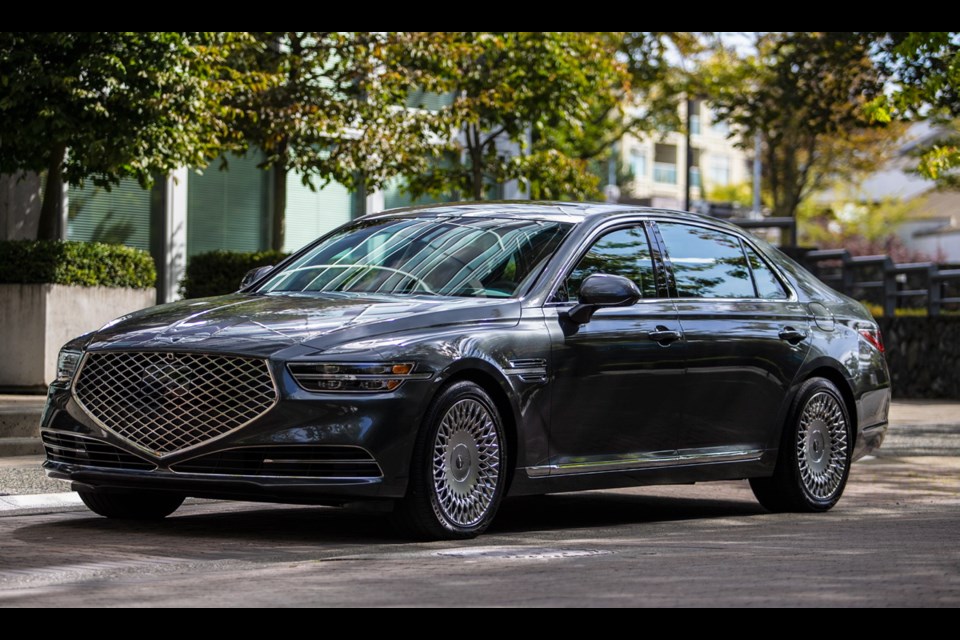Genesis is hoping its business model will appeal to buyers as much as the vehicles it sells.
The young luxury brand, spun off from the Hyundai umbrella, has gone to great lengths to set up as a viable competitor to more established brands such as Lexus, Mercedes-Benz or Lincoln.
Although Genesis will happily sell you a new luxury car, what it’s offering buyers is a different ownership experience.
It has borrowed a concept from another young, successful brand — Tesla — by eliminating traditional brick-and-mortar dealerships and taking everything online.
Interested in a car? A representative will bring it to you — at home or your place of work.
Haggling? Forget about it. It’s a fixed price.
Need maintenance? A representative will come to pick up your car and leave you with a loaner. For the first five years, all your maintenance charges are free as well.
But do its vehicles meet the brand’s lofty goals?
I drove a 2020 Genesis G90, the flagship of the brand, to find out.
Before I drove the car, I toyed with the online configurator. What I discovered was that, unlike for almost every other manufacturer, extras were limited.
There is only one trim. You have a choice of exterior and interior colours, of course (at no extra charge), along with accessories, such as floor mats.
The final price even includes freight and preparation and delivery inspection.
For anyone who has chosen a vehicle, only to find the final price with the goodies you really want can add tens of thousands of dollars to the bottom line, so far so good.
As the new kid on the block, one would expect that they would try to undercut the competition.
With a list price of $89,750, it is certainly the most expensive vehicle from South Korea. In comparison with some of the others in this segment, however, it sounds like a deal. The Lexus LS 500 starts at $103,150, while the BMW 740Le xDrive is $117,750 — both not including obligatory freight and PDI charges.
But how about the car itself?
The Genesis certainly looks the part of a high-end luxury sedan, with styling cues that tell a casual observer that it runs in the right crowd.
The two biggest changes over the past year include a more in-your-face grille and bespoke wheels.
The visual masterstrokes transform an also-ran candidate into a contender. My only surprise is that they left the wheels at 19 inches. The BMW, by comparison, now proudly wears 21-inch rubber.
At more than 5,200 millimetres long, the G90 is a full-size car. As with the BMW, you can regard the car almost as a mini limousine. With a wheelbase of 3,160 mm, rear head and legroom is more than generous.
The centre armrest in the back seat doubles as a secondary command console, giving rear passengers full control of their environment.
The rear occupant can also control the front passenger seat, to enhance their legroom, for example. The right rear seat, the best seat in the house, can be adjusted 14 ways.
The rear doors are long and open wide, both benefits for people accessing the rear seats more than occasionally.
The only difference from riding in a regular limo is there is no glass partition.
If you plan on doing your own driving, you will find the front seat equally inviting, including a 12.3-inch widescreen infotainment system screen.
Genesis must have taken apart the competition, analyzed every component and included them in the G90. Soft-close doors? Check. Whisper-quiet cabin? Check. High-end sound system? Check. Open-pore wood trim? Check.
Although equipped with a 420-horsepower, 5.0-litre V8 that produces a muted roar under hard acceleration, the G90 would not be at the top of the list of an enthusiast driver. It’s a luxury vehicle, not a sports/luxury offering. While it offers good control, I can’t say it would be my first choice for back roads.
It does feel secure, thanks to the standard all-wheel-drive.
The full-size luxury-sedan segment of the market, as with the sedan market in general, isn’t growing — unlike the luxury SUV segment.
With the market already crowded, it will be a challenge for Genesis to gain market share. But an innovative business model, a lavishly equipped car and an eyebrow-raising price may be enough to entice buyers to check out the newest kid on the block.
The spec sheet
Type: Full-size luxury four-door sedan, front engine, all-wheel-drive
Engine: 5.0-litre V-8, 420 hp at 6,000 r.p.m., 383 lb.-ft. of torque at 5,000 r.p.m.
Transmission: Eight-speed automatic
Dimensions (mm): Length, 5,205; width, 1,915; height, 1,495; wheelbase, 3,160
Curb weight (kg): 2,225
Price (base/as tested): $89,750/ $89,850 (includes freight and PDI and $100 AC tax)
Options: Nil
Tires: 245/45 R19 front, 275/40 R19 rear
Fuel type: Premium
Fuel economy (L/100km): 15.2 city/ 10.2 highway
Warranty: Five years/100,000 km new car, five years/100,000 km powertrain and five years/unlimited km roadside assistance


